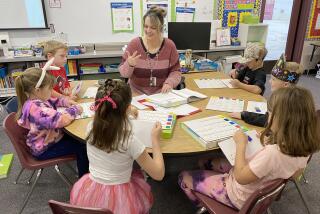U.S. Adults Lagging in Literacy, Study Finds : Education: Report says nearly half have only the barest language and math skills. Growing societal ‘fault line’ seen.
- Share via
Nearly half of American adults are “at risk” in today’s technologically advancing society because they possess the barest of language and math skills--although the majority of them believe they can read or write English well, according to a landmark study released Wednesday by the U.S. Department of Education.
The study, which tested 13,600 adults throughout the country last year, also indicated that America’s grip on literacy may be slipping: Literacy scores for people ages 21 to 25 have declined significantly from just seven years ago.
U.S. Secretary of Education Richard W. Riley called the findings a “wake-up call to the sheer magnitude of illiteracy in this country.” He also warned that it reveals a widening societal “fault line” between those with enough education to keep up in the information age and millions of others who can manage little more than adding figures on a bank deposit slip or reading a map.
“It’s bound to be a shock when you look at the complexity of our economic system, and the requirements that a person has to have to function well in that system, and to say that 90 million adults in this country don’t have the skills to do that,” Riley said.
Riley stressed, however, that the study does not mean that those who scored lowest are ignorant, only that they are lacking in skills to synthesize or sort information. Many of those who did poorly were immigrants, the elderly or prison inmates.
Still, 20% of those who had the worst literacy skills possessed high school diplomas, the study showed. Noting that some of those people hold good jobs, Riley said: “They’re basically illiterate, but they’re bright enough to cover it up.”
The study, commissioned at the urging of Congress, has been four years in the making and was conducted by the Educational Testing Service of Princeton, N.J., the firm responsible for college placement exams. During the first eight months of 1992, ETS interviewed 13,600 people 16 years or older who were randomly selected to represent the country’s adult population of 191 million.
Federal researchers said the study is the most comprehensive of its kind and is not intended to simply count illiterates--estimated to be about 20% of the adult population. Instead, they said they wanted to establish a national benchmark of skills by rating respondents on how well they can find information in newspaper articles and other texts, how well they use such documents as charts and graphs, and how well they can carry out mathematical calculations based on reading forms and other materials.
The study divided the scores into five levels of competency and found:
* Twenty-three percent of American adults, or up to 44 million people, are illiterate or can perform only the barest of tasks, such as signing their names or adding up a bank deposit slip--providing the numbers were supplied for them. About 25% of the people in this group were immigrants, two-thirds never finished high school and a third were 65 years or older.
* Another 24% to 28% of those tested, or 50 million people, were in the second-lowest level of literacy--able to understand an appliance warranty, find an intersection on a street map or calculate postage for certified mail.
Combined, these two groups of 94 million people represent about 49% of the adult population and are considered those “at risk” in today’s rapidly changing economy, the study concluded. Although these adults rarely finished high school, the study showed, the overwhelming majority do not consider themselves at the bottom of the literacy ladder and would tend to think that adult education programs are not intended for them.
* In the only indication of a trend, the study showed that literacy skills have slipped for adults ages 21 to 25. When compared to similar tests given in 1985, scores in that age group were 11 to 14 points lower--a margin that one of the report’s authors said was “significantly different.”
The authors said the reason for the lower scores was an increase in the number of young Latinos who were born elsewhere and are learning English.
* Men scored about the same as women on reading proficiency but higher on using documents and math. Of all those tested, people from the Midwest and West scored better than adults in the South or Northeast.
* Not surprisingly, the study showed that the more formal education a person had, the greater the literacy skills and earnings. Those who ranked in the top three levels in the study made $350 to $680 a week, were more likely to have voted in recent state and national elections, and were more likely to get their information from printed sources, such as newspapers.
Those on the lowest literacy levels, meanwhile, made about $230 a week, were living in poverty, were less likely to vote and were less likely to have worked in the previous year.
“We’re creating two societies--those that can do and those that can’t,” said Irwin Kirsch, executive director of the Department of Education’s testing and assessment group. “And the gap is widening between the two groups.”
The study also found that the elderly are among those with the worst literacy skills. Kirsch said that may be caused by the onset of ailments.
Anglos also did much better than other ethnic groups, the study found. Factors contributing to the differences included the fact that Anglo respondents were more likely to have gone to college, and more likely to have parents who were well-educated and were native born.
In fact, U.S.-born people in all ethnic groups had similar literacy levels and fared much better than those who shared the same heritage but were immigrants trying to learn English, the study said.
Researchers said they will soon be releasing separate literacy statistics for California and 11 other populous states.
More to Read
Sign up for Essential California
The most important California stories and recommendations in your inbox every morning.
You may occasionally receive promotional content from the Los Angeles Times.













